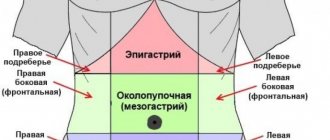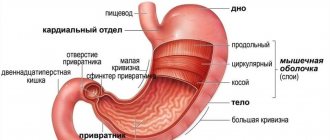Why does my stomach hurt after eating garlic, and what to do about the pain?
Garlic contains a huge amount of substances in its composition. So, in addition to proteins, vitamin C, polysaccharides, and even sugar, there is essential oil, organic compounds of sulfide groups, so-called phytoncides, antioxidants, numerous acids, including pyruvic, coumaric, and oleanolic.
In addition, it contains salicin, sitosterol, geraniol, phloroglucinol, rutin,
You will be interested...
Symptoms and consequences of poisoning with salted mushrooms: saponins, cysteine and other components.
Once in the body, they have an activating and irritating effect on the mucous membranes , which, in the presence of various diseases of the gastrointestinal tract, such as gastritis or ulcers, can cause pain in the stomach or abdomen from garlic.
Increased secretion of gastric juice in large quantities also provokes flatulence and belching. Actions you can take:
- First of all, check for the presence of gastritis, ulcers or other gastrointestinal problems;
- Secondly, temporarily stop using the product and after a while try to introduce it into the diet again;
- If the negative effect persists, then it is better to stop using garlic altogether.
Effect of garlic on the stomach
Why does garlic make my stomach hurt? The answer is quite simple. Its composition (as well as onions too) includes trace elements such as iron, manganese, copper, zinc, selenium, sulfur; B vitamins and other types of substances.
Some of them are serious irritants of the vulnerable gastric wall.
After eating garlic and onions, intensive production of gastric juice occurs, which, in turn, contains a certain amount of peptins and hydrochloric acid.
When there is damage to the gastrointestinal mucosa, for example the presence of gastritis, ulcers, then after adding all kinds of seasonings, the appearance of pain that radiates to the stomach cannot be ruled out.
If the gastric mucosa is in a normal physiological state, the feeling of pain is excluded.
In addition, garlic contains fructans, which are a compound commonly found in many foods, including fresh or cooked garlic, and garlic powder.
Fructans consist of a chain of fructose and are not digested in the human body.
Most people tolerate these substances without any side effects, but they may have unpleasant effects on some sensitive people or those who have unbalanced gut flora.
The most common symptoms associated with fructan intolerance include abdominal pain and discomfort, bloating, and changes in bowel function.
If your stomach hurts, it is likely that your gastrointestinal tract is not able to digest fructans properly.
If you have a sensitivity to fructans, eating foods containing these substances will cause excessive bacterial fermentation in the gastrointestinal tract.
The excess gas resulting from the fermentation of fructans can lead to bloating, flatulence and characteristic pain due to stretching of the walls of the organ.
However, there are no tests to diagnose fructan intolerance.
If the stomach hurts when a person eats garlic, then most likely a similar reaction will occur to other fructan-containing plants and vegetables.
Fructans are also found in all types of onions, wheat, rye, artichoke, watermelon, peaches, chicory root, and Jerusalem artichoke.
If a person has an intolerance or allergy to garlic, it can cause a range of symptoms, including digestive problems such as bloating.
Excessive gas produced in the digestive tract can lead to painful cramping and flatulence. Diarrhea, vomiting and nausea, as well as an itchy rash, eczema and wheezing can occur if you have a garlic allergy.
Allergies can be life-threatening, so be sure to tell your doctor about your concerns. The specialist will advise the patient on what needs to be done in this situation.
You can also try cooking without adding herbs and spices to see if this reduces the symptoms and manifestations of allergic reactions.
Causes of diarrhea from eating garlic
Some people who regularly use this product, including as an independent dish, complain of a change in their usual bowel habits. They often exhibit symptoms of diarrhea and also develop pain in the abdominal area.
It is noteworthy that none of the available components of the product systematically provokes diarrhea; moreover, in folk medicine and general practice it is used as an effective method of combating non-infectious diarrhea. Diarrhea from garlic can occur for several reasons:
- Individual intolerance to any of the components. People who are hypersensitive to certain natural compounds may experience individual intolerance to the product described above, including quite severe diarrhea.
- Eating a lot of foods. Any dish or food should be consumed in moderation. If you eat more than a couple of cloves of garlic every day, for example, several large heads, then this will definitely not benefit the body and can cause upset and a number of other problems with the gastrointestinal tract.
There are several ways to solve this problem. To begin with, try to significantly reduce the amount of product you consume, to a maximum of 1 or half a clove per day. If this does not help, then you will have to use alternative remedies that do not contain garlic or its essence.
Why do you feel sick after eating garlic?
For a number of people, the hot spice causes nausea when consumed, or after a short period of time after eating food that included the above-mentioned product. As practice shows, under certain circumstances, a healthy flavoring can cause a number of dyspeptic disorders, including nausea. Possible reasons why garlic makes you sick:
- First of all, the prerequisites for the development of nausea are formed due to excessive irritation of the mucous membranes of the stomach, from an allergic reaction or food intolerance to any of the components, other factors;
- Garlic provokes an increased secretion of hydrochloric acid , so the stomach tries to protect itself from potentially harmful effects. Also, in people suffering from chronic gastrointestinal diseases, such as ulcers, new lesions may open, as well as old ones may recover, and remission of the disease may change to exacerbation.
- In fairly rare cases, nausea when eating a product can be caused by poisoning from garlic grown in improper conditions or stored in the wrong places. In the latter case, intoxication disorder, in addition to nausea, includes fever, complex dyspeptic pathologies, and general malaise of the body.
What to do? There is no specific solution to the problem, so people are advised to stop using the product in its pure form and switch to less aggressive products.
How to recognize garlic poisoning?
Fans of spicy dishes with garlic flavor often have a question about what will happen if you eat a lot of garlic. In this case, heartburn from garlic and heaviness in the stomach are the most minimal harm to health. In other cases, symptoms of food intoxication occur, which are accompanied by cutting and cramping pain along the digestive tract.
In addition, garlic poisoning causes the following symptoms:
- The appearance of dyspepsia. If there is a sharp deterioration in health, the victim notes that the stomach hurts from garlic, it becomes swollen, due to increased gas formation, nausea appears, which gradually transforms into vomiting. However, after eating garlic, diarrhea does not occur immediately. It is preceded by discomfort in the lower abdomen.
- Feeling of loss of strength. A person begins to experience a headache, which is mainly localized in the back of the head. Muscle weakness appears, and unpleasant thoughts arise due to depressed mood.
- Manifestation of fever. An abrupt increase in body temperature can be abruptly replaced by a rapid decline. As a result, the victim begins to sweat heavily and a feeling of chills appears.
Possible causes of heartburn
The most typical negative symptom, which quite often accompanies the consumption of garlic even in healthy people, is heartburn. Due to the complex complex composition of this seasoning, as well as the presence of a large amount of acids in it, the preconditions are formed for excessive irritation of the mucous membranes of the stomach walls, as a result of which increased secretion of juice and a number of dyspeptic disorders are observed.
The problem is aggravated if a person consumes garlic regularly in large quantities, and also has chronic diseases of the gastrointestinal tract, such as gastritis.
What to do in this case? First , you should undergo a complete diagnosis of the body by specialized medical specialists , including ultrasound of the gastrointestinal tract. In the absence of visible pathologies of the gastrointestinal tract, you need to gradually reduce the amount of garlic you consume and keep it to a minimum. If heartburn continues to torment the human body, then the only way out is to completely abandon the product.
What to do
If, after eating any dish containing garlic or onions, a person regularly feels pain, he is advised to immediately go to the doctor.
We must not forget that it is always more effective to take preventive measures than to subsequently engage in treatment.
Medical experts often make recommendations for specific diets in this situation. This means the need to exclude fatty, spicy and salty foods from the diet.
It is important to note that the reaction of the digestive system to eating garlic or onions cannot appear just like that; usually painful feelings arise only in the presence of peptic ulcers, gastritis and other stomach diseases.
Therefore, to alleviate symptoms and eliminate negative consequences, the patient needs to make a visit to the doctor in advance, who will answer questions about why the stomach hurts and what the patient should do in this case.
Can garlic cause heart and headache problems?
Modern alternative medicine actively uses garlic for various diseases of the heart and blood vessels. As new global research shows, allicin contained in garlic relaxes the smooth muscles of the walls of blood vessels and relieves their spasm, which ultimately helps reduce the likelihood of myocardial infarction and stroke.
In addition, with fairly frequent use of garlic, systemic blood flow is additionally activated. However, all the properties described above also have another side. Thus, the blood thins out under the influence of individual components of garlic.
Moreover, with very frequent and excessive consumption of garlic, the pulse quickens, tachycardia, interruptions in the rhythm of heart contractions, and also surges in blood pressure can be observed.
It should be noted that the vasodilating effect of garlic on a constant basis sometimes causes attacks of pain in the head .
First of all, you should normalize the amount of garlic you consume and reduce it to the recommended amount, for example, no more than half a clove per day. It is also advisable to combine pure products with diluted essences, of course of proper quality. If cardiovascular problems do not disappear after adjusting the diet, then it is better to stop using the drug altogether.
Treatment for a garlic burn?
Prolonged direct contact of individual garlic compounds with mucous membranes and skin can provoke a burn due to the presence in the product of a fairly large amount of acids and other complex elements, often quite aggressive. What types of burns are there in this situation?
- Skin. A number of traditional medicine recipes suggest applying garlic compresses to intimate parts, face and other parts of the body that do not have specific protection against the aggressive effects of individual components of the product. Prolonged activities are fraught with the formation of a burn of a chemical nature and are characterized by severe burning, pain and redness;
- Burns of mucous membranes. Formed when a large amount of concentrated product gets on the mucous membranes. Most often this happens in the stomach, less often in the nasal cavity and other places where garlic-based drops are instilled.
What to do if a garlic burn develops? First of all, use topical agents, for example Panthenol, Cicaderma, Cameton aerosol, Strepsils tablets, Viaton drops and other medications. Almagel is optimal for oral administration. If the burn does not disappear within 3-5 days, then you should consult a doctor for additional recommendations, an examination and the prescription of the necessary conservative therapy.











